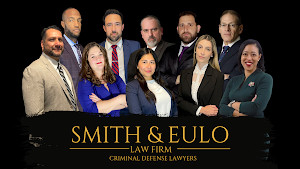
100+ Years of experience
Award-Winning Criminal
Defense Lawyers Serving
Lakeland And All Of Central Florida
We have one of the few Board Certified Criminal Trial Lawyers in the state of Florida.
Lakeland, FL
Criminal Defense Attorneys
When you’re facing criminal charges, your first instinct is probably to explain that there’s been a mistake and you’re not guilty. However, in such situations, it is advisable to stay calm, not resist arrest, and follow the instructions of the law enforcement officers. Exercise your right to remain silent, and politely request to be allowed to speak to your attorney. The law permits you to make one phone call. And, at the first chance you get, call Smith & Eulo, or top Lakeland criminal defense attorneys. The first consultation is absolutely free of cost.
Putting Together a Defense Strategy is a Complex Process
Whatever the charges you’re facing, know that devising a defense strategy is a complicated process best left to the experts. Your attorneys will connect with the prosecutor to understand the charges and collect detailed information. They’ll interview witnesses, subpoena documents, and get copies of police reports. After talking to you, they’ll piece together an accurate picture of the events and create a robust game plan to get the charges cleared. Your lawyers will create compelling arguments to present in court and study past rulings to make their case.
Contact Us Today!
We strive to achieve fair and just trials for all or our clients, and we can do the same for you. Call us today at 863-272-7010 for a free case review with our qualified criminal defense lawyers.
Criminal Defense Encompasses Different Kinds of Cases
The attorneys at Smith & Eulo Law Firm: Lakeland Criminal Defense Lawyers are trained in different areas of the law and can provide you with expert assistance in all kinds of cases such as:
- Murder Charges
- Robbery
- Sexual Battery
- Assault
- Juvenile Defense
- Burglary
- Resisting Arrest
- Probation Violation
- DUI
- Domestic Violence
- Drug Crimes
Murder Charges
The penalties for murder depend on the reasons behind the act. For instance, self-defense, a robbery gone wrong, pre-planned, international, or accidental. The penalties can range from a few years in prison to the death penalty. Murder charges can be of three kinds such as:
- First degree or capital murder – This is the most serious offense and occurs as a result of a carefully executed plan.
- Second degree – Incidents that happen in the heat of the moment with no prior planning or intention.
- Third degree or manslaughter – Usually the result of an accident like running a red light or negligence like drunk driving.
Robbery
The law defines a robbery as the “act of intentionally taking another person’s property without their consent.” A robbery is considered a felony offense and the penalties depend on the specific category of the offense. For instance:
- First degree robbery – Using a deadly weapon to threaten another person and steal their property, carries the possibility of a maximum 30-year prison term or a life sentence.
- Second degree robbery – Committing a robbery using actual physical force or threat and harming the victim carries a punishment of 15 years in prison or 15 years of probation.
- Third degree robbery – Sudden snatching without using any violence, threat, or force carries a penalty of five years in prison or 5 years on probation.
Sexual Battery
Any kind of unwanted sexual act without the consent of the other person is considered a sexual battery. The act includes:
- Any kind of sexual contact even if it is just touching
- Actual penetration is not necessary
- The victim can be fully clothed or nude
- Any kind of violence or force with the intention of penetration or union
- Statutory rape where the partner is under the age of 14 years
- Any kind of sexual contact even though the victim non-verbally denied consent
Assault
Any action that causes fear of harm or a threat is considered assault. If actual unwanted touching or physical harm was incurred, that is considered a battery charge. The penalties will depend on the specific circumstances. For instance, if you felt threatened by an assailant who was carrying a deadly weapon and you reacted in self-defense, the charges can be lowered. Assault can be of different kinds such as:
- Misdemeanor charge or simple assault/battery
- Aggravated assault or felony/battery
- Aggravated battery or felony charge
Drug Crimes
In the state of Florida, juvenile cases are heard by a judge without the presence of a jury. Exceptions to this rule include a direct filed case where the trial is held in an adult court. The judge may direct that the child be held in a detention center or allowed to go home with their parents. A juvenile program may have any one of four commitments such as:
- A low-risk program that lasts from 30 to 45 days
- A moderate-risk program that lasts from four to six months
- A high-risk program that lasts from six to nine months
- Juvenile prison term that lasts from 18 to 36 months
Burglary
A burglary is considered a felony criminal offense where the accused enters or remains in a building or vehicle with the purpose of committing an offense. The other conditions for proving a charge include:
- The premises are not open to public
- Entering or remaining in the premises without permission or license
- Remaining in the premises with the intention of committing an offense even after permission has been revoked
A burglary can be first degree, second degree, or third degree and incur penalties accordingly.
Resisting Arrest
Any act that prevents a law enforcement officer from arresting you is called resisting arrest. If an officer asks a person to stop, provide identification, or to leave a location, it is advisable to comply with the instructions. Using violent or non-violent means to resist arrest can incur a misdemeanor or felony charge.
- First degree when the defendant refuses to be handcuffed.
- Second degree offense when the person tries to hide or run from the officer to prevent getting arrested. Going limp or tensing up is also resisting.
- Third degree offense when the person uses a weapon to attack the police officer or threatens with violence. Kicking and hitting the officer is a felony charge.
Probation Violation
Probation is typically part of the sentencing for a criminal charge. Not complying with court orders is considered a punishable offense. For instance:
- Negotiated plea where the judge awards prison time or community control, also called probation
- Split sentence where the defendant completes a combination of jail or prison time and probation
- Committing a new crime while on probation
- Not paying the costs determined by the court
- Testing positive for drugs
DUI
A DUI can not only affect your personal life, but your professional life life as well. DUI arrests can carry with them mugshots, a criminal record, and many other consequences that could exclude you from employment and other opportunities. Under Florida law, a fourth DUI (the last DUI mentioned in the statute) can result in up to:
- 5,000 in fines
- A third degree felony charge
- Permanent drivers license revocation
- Up to 5 years in prison
If you have been arrested on a DUI charge, call on one of our Lakeland DUI lawyers to review your case. We are experienced in defending DUI cases, and can identify flaws in your case that could lead to lesser charges, less monetary fines, and even a dismissal.
Domestic Violence
Domestic violence charges often are accompanied by additional charges, and can have a significant impact on personal liberties like child custody, spousal support, and more. Apart from personal consequences, you may also have an injunction issued against you to protect the victim. Violating this injunction can result in penalties up to:
- 5 years in prison
- 5 years probation
- $5,000 in fines
If you are arrested and charged with domestic violence, Smith and Eulo is here for you. We understand that your side of the story needs to be heard, and our Lakeland domestic violence lawyers can present your case in a clear, calculated manner. We know the Florida courts, and how to prepare the best possible defense for your domestic violence case.
Drug Crimes
Drug crimes can range from simple fines to life in prison, and everything in between. Depending on the offense and the amount of times you have been charged with the crime, you could be charged with a felony or misdemeanor for committing the crime. Common drug crimes that individuals are charged with include:
- Possession of a controlled substance
- Possession of a controlled substance with intent to sell
- Manufacturing of a controlled substance
- Drug trafficking
Even a minor drug charge can have severe consequences. If you are arrested for a crime involving drugs, contact one of our Lakeland drug crime lawyers to determine the best defense for your criminal case. We defend individuals charged with drug crimes every day, and will work tirelessly to ensure the best possible outcome for your case.


































































































































































































































































































































































































































What to Expect in Your Criminal Case
The criminal defense process will most likely be something you are very unfamiliar with. It can be very intimidating to go through the legal process by yourself, so ensuring you have the expertise of a great criminal defense attorney can put your mind at ease. If you need criminal defense representation in Lakeland, Smith & Eulo Law Firm is here to assist you!
Hire a Criminal Defense Attorney
The first step in the process of defending your criminal charges is to contact a qualified criminal defense lawyer. Most lawyers offer a free initial consultation to give you an idea of what it will take to defend your case, including our team at Smith & Eulo. You can schedule your free consultation with us by calling 863-272-7010.
Talking to Your Criminal Defense Lawyer
Once you’ve secured legal representation, your lawyer will ask you as many questions as possible to understand the details of your case. They will be able to tell you the likelihood of a positive outcome, as well as exactly what to do in order to achieve it. A good attorney will make certain you are completely prepared for your court date and will coach you on exactly what to say and do.
Lakeland Office
2420 N. Crystal Lake Dr., Suite 2-203
Lakeland, FL 33801
863-272-7010
